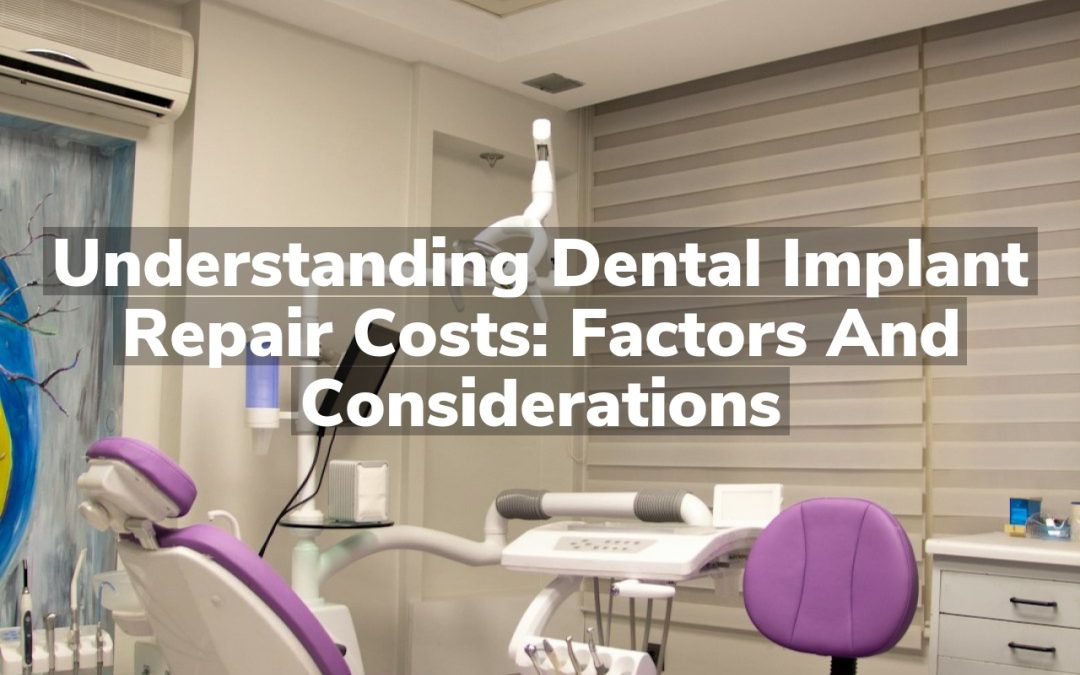Are you wondering what goes into the cost of dental implant repairs? At Conyers Dental Associates, we believe in transparent care, so let’s break down the factors and considerations that influence the expenses associated with maintaining your smile’s foundation.
Types of Dental Implant Repairs
When considering the costs associated with dental implant repairs, it’s essential to understand the different types of repairs that may be required over the lifetime of your implant. Minor repairs might involve adjusting the dental crown that sits atop the implant if it becomes loose or is slightly damaged. More extensive repairs can include addressing issues with the implant itself, such as re-osseointegration if the implant has not properly fused with the jawbone, or replacing the abutment, which connects the crown to the implant post. Each type of repair comes with its own complexity and cost implications, making it crucial for patients to consult with their dental professionals to get an accurate estimate.
In addition to understanding repair types, patients should also consider the importance of post-surgical care in maintaining their dental implants. Proper nutrition plays a pivotal role in healing and preserving the integrity of dental implants. For those looking for guidance on how to support their recovery through diet, Navigating the Dental Implant Recovery Diet for Optimal Healing offers valuable insights into selecting foods that promote healing while minimizing complications. By combining knowledge of repair types with diligent aftercare, patients can better manage their dental implant health and related expenses.
Material Costs for Implant Components
When considering the repair costs for dental implants, one of the primary factors to take into account is the material costs for implant components. These materials typically include the implant post (usually made of titanium), the abutment (which connects the post to the replacement tooth), and the crown (the artificial tooth itself). The quality and type of materials used can significantly influence the price, as some implants are made with zirconia or other specialized materials that may offer aesthetic or functional benefits but come at a higher cost. Additionally, the complexity of the procedure and the need for custom fabrication can also affect the overall expense.
It’s important to remember that while upfront costs might seem steep, investing in high-quality materials can lead to a more durable and long-lasting dental implant, potentially saving you money in the long run on additional repairs or replacements. To ensure you’re making an informed decision about your dental health and finances, consult with a professional who can provide a detailed breakdown of costs. If you’re looking to Restore Your Smile with Conyers Dentist, they can offer expert guidance on the best materials for your specific needs and help you understand the investment involved in dental implant repair.
Labor: Dentist’s Expertise and Time
When considering the costs associated with dental implant repair, the labor involved is a significant factor. This not only encompasses the time spent by the dentist to diagnose and fix the issue but also reflects their level of expertise. Highly experienced dental professionals who specialize in implantology may charge more for their services due to their advanced training and the precision required for complex repairs. The duration of the procedure also plays a role in the overall cost, as longer, more intricate repairs necessitate additional chair time and resources. Patients should understand that investing in a skilled dentist’s labor is crucial for the longevity and success of their dental implant repairs.
Complexity of the Repair Procedure
When evaluating dental implant repair costs, the complexity of the repair procedure is a pivotal factor that can significantly influence the price. Simple fixes, such as tightening a loose abutment, will generally be more affordable than complex restorations involving bone grafts or replacement of the implant itself. The intricacy of the repair is determined by the extent of damage to the implant, the condition of the surrounding bone and gum tissue, and the need for additional components or materials. As such, a thorough diagnostic assessment is essential to determine the precise nature of the repair, which in turn dictates the level of expertise required, the duration of the procedure, and ultimately, the cost. Patients should consult with their dental professionals to understand the specific details of their implant repair needs and receive an accurate cost estimate tailored to their situation.
Insurance and Financing Options
When considering the costs associated with dental implant repair, it’s crucial to explore the role of dental insurance and the availability of financing options. Many dental insurance plans classify implants as a cosmetic procedure, which can limit coverage or exclude it altogether. However, some insurance policies may cover a portion of the costs if the implant is deemed medically necessary. It’s important to review your insurance benefits carefully and discuss coverage with your provider. For out-of-pocket expenses, many dental offices offer financing plans or partner with third-party financial institutions to make the cost more manageable. These plans often allow patients to pay for their dental implant repairs over time, sometimes with low or no interest. Always inquire about such options, as they can significantly alleviate the immediate financial burden and provide a feasible pathway to restoring your dental health without upfront payment in full.
Conclusion
For personalized guidance on your dental implant recovery, call Conyers Dental Associates at 770-483-6655, and don’t forget to read our reviews on Google Maps.

